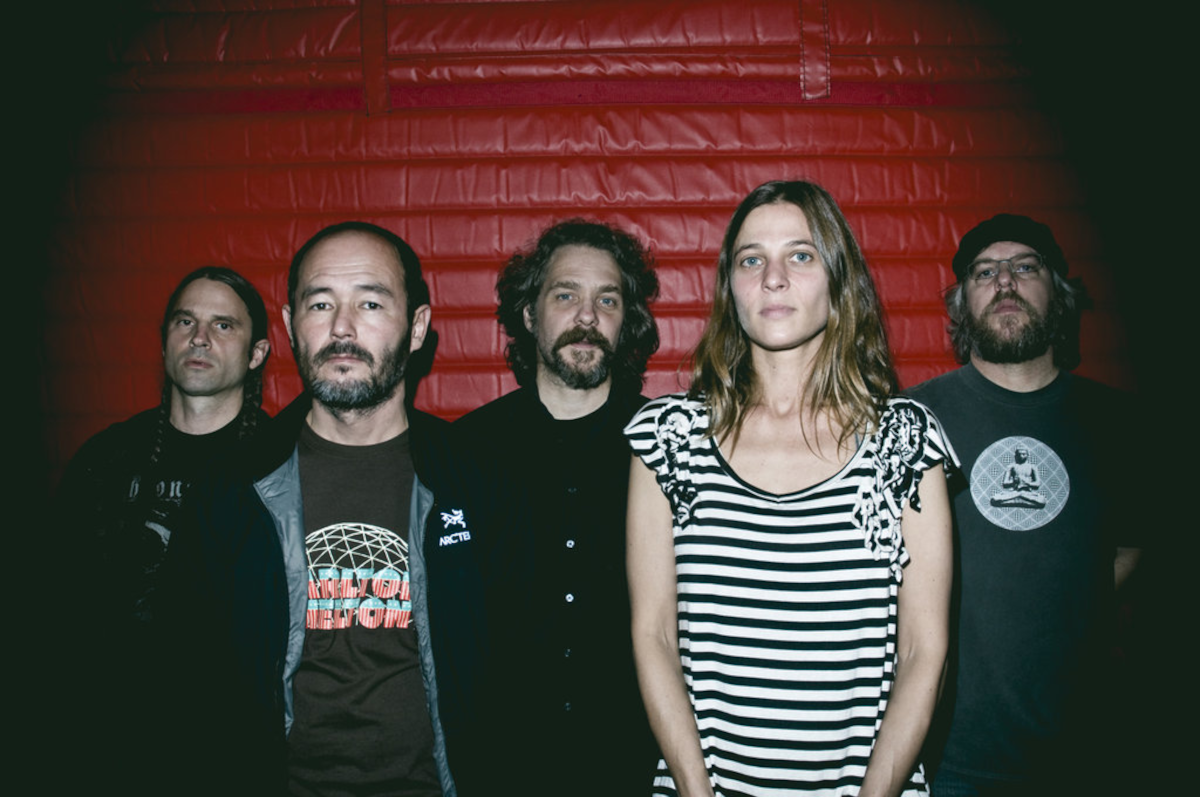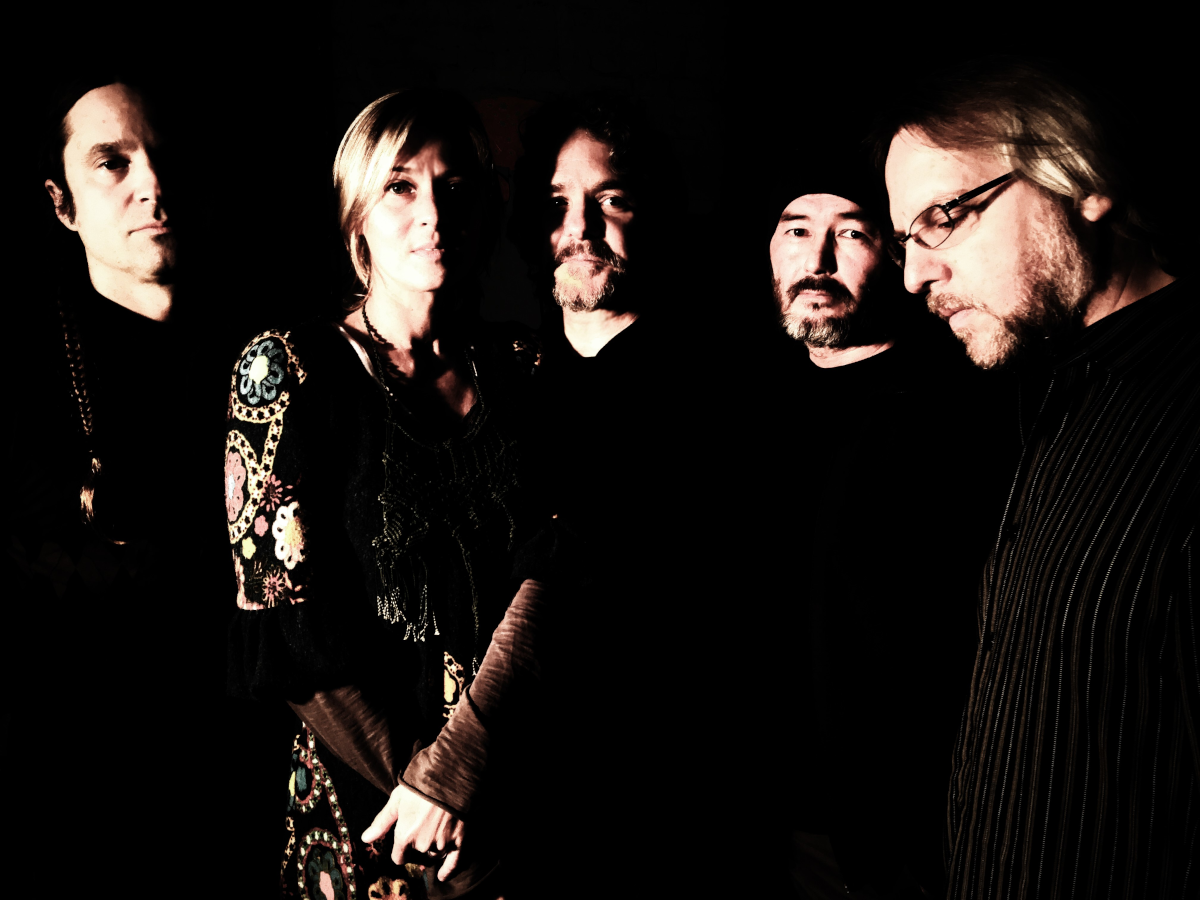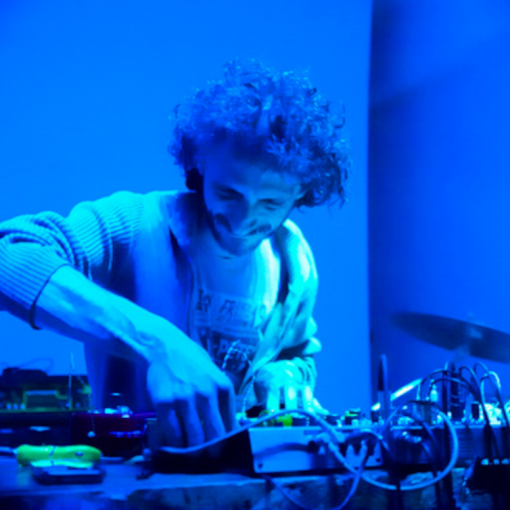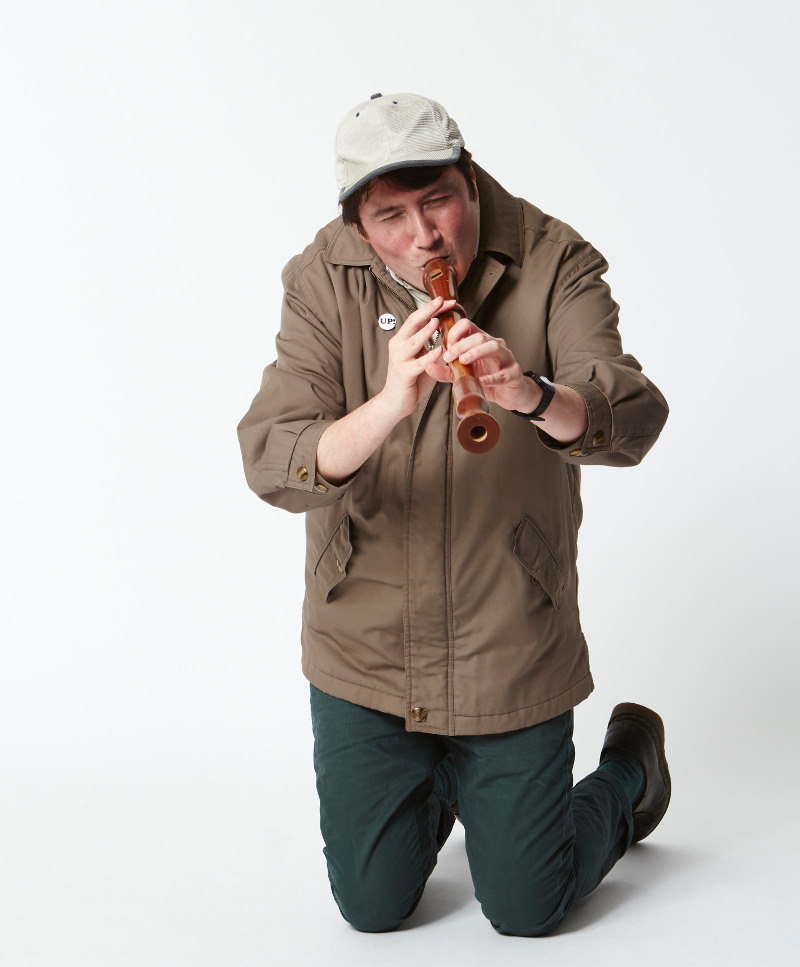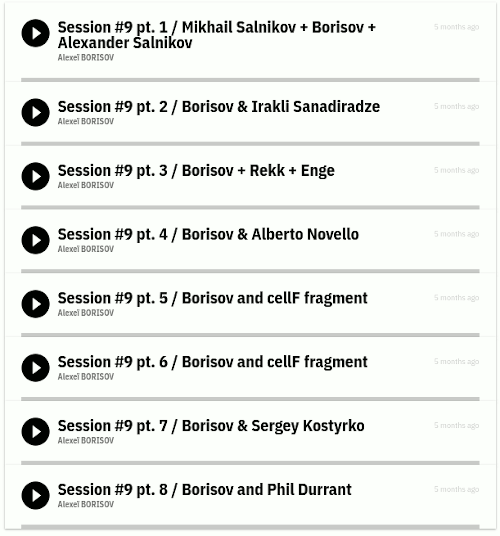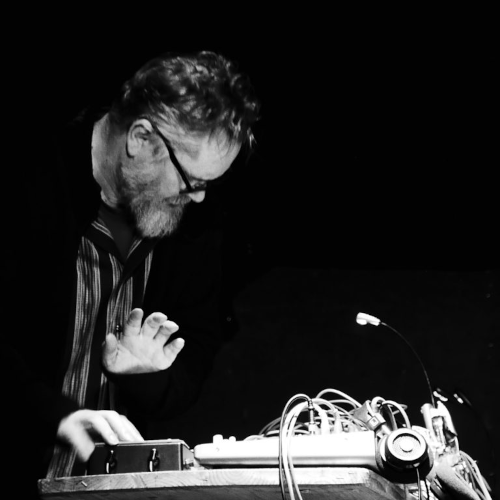If it were possible to conduct a collective musical DNA test upon Philadelphia’s Bardo Pond, then the band’s aural ancestry would no doubt contain multitudes.
Enmeshed in the shared sonic gene pool are strong traces of all manner of vintage psych-rock outfits, shamanic cosmic jazz, Black Sabbath sludge, the more guitar-wielding strands of vintage kosmische, no-wave noise, ‘80s-era Sonic Youth, early Spacemen 3 and plenty more besides. Yet the group’s genetic threads have distinctly fused into a cohesive hive-minded essence. Whilst wild eclecticism is not the prime characteristic in of all this, relentless consistency and continuity are the crucial overriding Bardo Pond hallmarks.
Since the start of the ‘90s, the core line-up of guitarist brothers Michael and John Gibbons, bassist Clint Takeda and vocalist / flautist Isobel Sollenberger (around which several drummers and other players have rotated) have delivered a body of work which is both colossal in its size and weightiness that has laid down an influential trail which loyal fans and recording artist disciples alike have followed with devotion. And that’s before we even talk about multiple notable side-projects and collaborations.Latterly, although Bardo Pond’s new activities have slowed somewhat, the band’s bounteous back catalogue and previously unreleased tape vault extractions are being given considered curatorial care through regular releases on Fire Records, Three Lobed and Matador. With the latter label having just exhumed 1999’s churningly squally Set And Setting long-player, alongside Melt Away, a double LP of choice rarities built-up around the ensemble’s four-album Matador affiliation, the time seemed more than ripe for Adrian to converse over email with Michael Gibbons on the past, present and future of Bardo Pond for Freq.
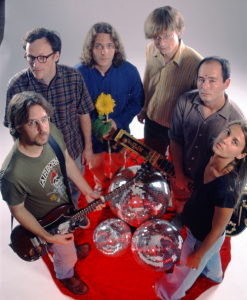 For a few years now, it that feels like barely six or so months pass without some form of Bardo Pond archive release emerging, via Fire Records, Matador or Three Lobed. This must take quite a bit of logistical effort behind the scenes. How much are you involved as a group, with each thing that has appeared or reappeared, in terms of choosing what to tackle next, remastering, revisiting artwork, sorting out recording rights matters and so forth?
For a few years now, it that feels like barely six or so months pass without some form of Bardo Pond archive release emerging, via Fire Records, Matador or Three Lobed. This must take quite a bit of logistical effort behind the scenes. How much are you involved as a group, with each thing that has appeared or reappeared, in terms of choosing what to tackle next, remastering, revisiting artwork, sorting out recording rights matters and so forth?
Has anything been notably problematic to bring back into physical existence, for whatever reasons?
Nothing has been particularly problematic. Luckily our archives are in half-decent condition so things are usually available after a search.
Are you often pleasantly surprised with the sustained appetite for your somewhat intimidatingly large catalogue?
Yes, definitely glad that people are still interested and listening.Do you think that you are picking up more late-coming fans in the process or largely keeping existing ones satisfied and saved from Discogs traumas?
That’s a good question and it’s hard to gauge that one. I would definitely hope that we are still picking up fans, but it’s hard to say. It’s possible that we are keeping fans happy through all these years gauging from what I occasionally read in YouTube comments of Bardo content, and the consistency of the interest in collecting our output from year to year.Turning to one of the two latest archive releases freshly arriving on Matador – specifically a straight-ahead vinyl reissue of 1999’s Set And Setting. Where do you consider that this one sits in terms of both its place in Bardo Pond’s four-album run for the label and your career as a whole?
I feel that it is the heaviest of the four and indeed of all our LPs. It’s one of my favourites.
I understand that Set And Setting was the first LP to emerge from your own Lemur House studio. Was setting-up your own recording environment a real game-changer in terms of your creativity and productivity?
It does mark when we accessed the ability to decently record our sessions at our Lemur House studio. We had invested in ADAT recorders, microphones and outboard equipment and were recording everything we did. We were able to operate like Can did at Inner Space, maybe less inventively, nor with the insane gear they were working with, but we had a similar access to a mass of recordings. It was a game-changer and a lot of fun.Your time with Matador coincided with one of the label’s most distinctive purple patches for some of its most well-known and successful artists – such as Yo La Tengo, Pavement, Guided By Voices and The Jon Spencer Blues Explosion. Did you feel like outliers as labelmates in comparison or did you feel just as valued in your own niche?
We dug all the Matador bands, and it was amazing to be on the label. We felt very loved.
The now simultaneously released Melt Away double-LP rounds up some substantial rarities from your stint with Matador. Did many of the gathered pieces just not fit on the other regular records or did they have separate recording lives of their own, as it were?
Melt Away is material that I discovered when I was looking for the original recordings for the Matador LPs and their masters. Half of it is culled from the DATs our producer J Cox created during the recording sessions of Amanita and Lapsed. “Tapir Dub” was a mix he created. These DATs were a record of each session, featuring all the takes of the songs, and the occasional improvised jams that would happen. Due to [the] time constraints of the format, a lot of recorded music wound up not included on the LPs. It was a nice surprise finding the stuff and fun to put together a record from it.I’m especially looking forward to the promised vinyl reissue of 2001’s double-length Dilate, as the first Bardo Pond album that really grabbed my attention, due largely to its eclecticism and relative accessibility. When is that – as well as 1997’s Lapsed — likely to get Matador’s retrospective treatment?
Thanks. I know that they are both in the works to be reissued as well by Matador. I’m not sure what the release schedule is.Do you hold strong views on whether Bardo Pond’s music works best on vinyl, given it is the format that has been the prime focus for the archive initiatives of the last few years?
You bet your sweet bippy I do! Vinyl LPs are the sublime way to experience a recording artist’s music. The visual and tactile experience of looking at and handling the cover, then carefully removing the LP and putting that slab on the turntable and then experiencing the sound as heard on vinyl, blows away any digital experience of music. Hearing music as sequenced on an LP is essential.
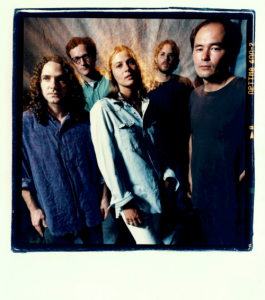 How much has the construction process for your songs changed and remained the same over the duration of Bardo Pond’s lifespan to date? Does everything evolve from collective jams or do you sometimes bring in ideas separately?
How much has the construction process for your songs changed and remained the same over the duration of Bardo Pond’s lifespan to date? Does everything evolve from collective jams or do you sometimes bring in ideas separately?
The studio comes in handy because we can listen to what happens while we are practising the riff. Listening back to these practices will occasionally reveal a way forward. Maybe one of us will do an improvisation that is inspired by the main riff and that can become a different part of the song that we work on, so now the tune has two parts. It’s very organic, the way it develops.
In particular, how does Isobel integrate her distinctive role into what other bands of a similar mindsight might have left as instrumentals?
Isobel has mysterious ways that she connects to what’s going on. Sometimes right off the bat, she will have lyrics or an idea for the flute and how it’s going to sit in the mix. Sometimes it takes a while for her to find her part. Sometimes she doesn’t find a part.How important are the disciplines of overdubbing, post-production and editing in the final crafting exercise for most Bardo Pond records?
They’re very important for vocals. We work from live takes of full band recordings and live vocals are recorded at this time. After we have a satisfactory take of a song, we can kind of work backwards deconstructing and reconstructing the recording track by track, instrument by instrument. For vocals this is great because the live recordings usually have bleed from the other instruments.
We do overdubs of the vocals, sometimes several, and work with them to create the song. There’re many songs that have acoustic guitar added in some way as overdubs. Occasionally drums and electric guitars are worked on or added.Is it hard knowing when to stop with having your own recording studio set-up?
That’s a funny question … it is a very fine line between feeling comfortable with the ‘final mix’ and feeling like it really, really needs a lot more work …
Despite the girth of your catalogue, there haven’t been that many live recordings released. Why do think that is?
Live recordings are tricky and it’s really difficult to capture a decent recording and decent performance at the same time. Now that you mention it, that would be a fun project. It’s a possibility to happen.Do you ultimately prefer Bardo Pond in the environment of the studio or Bardo Pond as a live band?
It’s special either way. Live, things evolve with the energy from the crowd. Amazing and singular moments can happen that can’t be created in the studio setting. Studio vibes are very relaxed and can lead to spontaneous events that perhaps live we wouldn’t attempt.
Would it be fair to say that you’ve collectively been inspired by the wider philosophical and cultural tenets of vintage psychedelia, as much as the sounds?
Psychedelics have inspired us. Love, the interconnectedness of all things … Free your mind and your ass will follow …
You have delivered some pretty stellar cover versions here and there, as best exemplified by the Record Store Day trilogy on Fire Records. Does tackling other artists’ material challenge or free you up as a band?
Hey, thank you. Covers feel like assignments or challenges that we create for ourselves. It’s amazing feeling that happens when you start to get the feel of the song you are covering. Kind of like unlocking a door and entering into a room that can feel very cosy.What do you think has helped to sustain the way you work together for so long? Are there a lot of unspoken creative connections that keep you bonded?
Bardo Pond, from the very beginning held us all under its spell. We had no other choice but to keep it going. The place that music can take you is extremely beautiful, singular and addictive. One of our goals in making the music is to have it trigger the brain to release endorphins when it’s heard.How radically has your communal approach to making music been altered when you have conjoined with other outside artists, as you notably did with Acid Mothers Temple and Guru Guru for the Acid Guru Pond album that has also just been reissued via Fire Records.
It’s not altered at all. It is purified. The collaboration records are records of jam sessions and improvisations that are heard as played.
Is Philadelphia still the primary base of Bardo Pond operations? How important has the city been to the band over the decades?
Love City is the birthplace of Bardo Pond. Bardo Pond could not exist anywhere else.I understand that most Bardo Pond members have continuously held down day jobs in the visual arts in some form or another. How has this both freed you up or restrained you, in the ways that you have functioned?
We all come from working class families and all of us have had to work our entire lives just to keep things going and not become homeless. For years, we were working as freelancers, so we were able to schedule time off in which we could do tours.
It’s hard to imagine the likes of Eternal Tapestry, Comets On Fire, Electric Moon, Mogwai and younger likeminded outfits having existed in quite the same way without Bardo Pond having paved the way directly or indirectly. Whilst I can still trace back to the things that have evidently inspired you, it feels like you have gradually and inadvertently become your own genre touchstone. With that in mind, do you think that have latterly become more recognised for being influential, rather than being cited in relation to your own original influences?
Thank you for what you said here, I appreciate it. Having said that I have to admit that it’s hard to answer your question. It’s nice to imagine us being influencers but I have no idea if we are or not.
What are your personal or collective favourite Bardo Pond albums from across your entire canon?
They each occupy their own special place in my heart when I think about our history. I love all our collaborations. + Tom Carter, Acid Guru Pond, Hash Jar Tempo, LSD Pond. I love every Bardo Pond album from Bufo Alvarius through Under The Pines as well as all the Volumes [compilations]. I feel like each release is a facet of what we are as a band.It seems like it’s been fair while since you released new material and toured. What has led to the slowing of pace? Do you have some new recordings in the works, as well as plans for more live shows and more archive release projects?
We had to move out of the warehouse in which our studio the Lemur House existed. Covid hit at the same time. There are other issues that are preventing us from moving forward since then. We will see what happens. There will be future releases in the Volumes series, and side projects and solo records. It remains to be seen if there is another Bardo Pond album proper. No, we aren’t doing any shows for the time being.*
